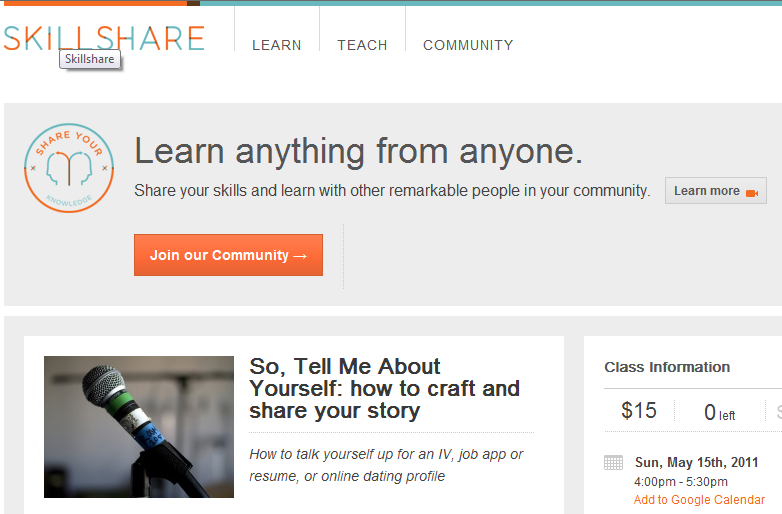Peer to Peer Knowledge Sharing
Have you checked out a site called Skillshare?
Skillshare is a kind of learning community where members offer to share their knowledge, sometimes for a fee, on a wide variety of topics ranging from design, to development, and even to hobbies like cooking and photography. Other Skillshare community members can register for these classes, which are all delivered live and in-person, (currently Skillshare does not offer eLearning capability).
The Skillshare site serves as a kind of marketplace or clearinghouse for the mutually beneficial exchange of knowledge from experts that are interested and incented to offer their skills and expertise to participating community members who are hoping to increase their knowledge on a given subject for personal or professional reasons.
Underlying the concept of a site like Skillshare is the notion that more traditional and 'formal' avenues and mechanisms for delivering this type of instruction frequently can't react quickly enough to changes in the public's demand for specific learning content, and by the time they could assemble resources, develop a curriculum, complete all the administrative tasks associated with offering new learning programs, that enough time may have passed that the demand for the learning content may have waned, or the market may have simply moved on. In a way just like these formal institutions Skillshare is the middleman, but one with much less friction and cost that can serve to separate producers of learning content from consumers of that content.
The other interesting angle of Skillshare is how it democratizes the learning process, any member of the community can register to offer a course or class; (currently topics are being vetted by the site curators before being offered), and any other member can attend. Integration with Facebook on the individual course pages adds an element of social participation and feedback to the design and delivery process. It represents a model worth examining by those of us that may work in a corporate or organizational setting and are tasked with creating, distributing, and evaluating the effectiveness of training and learning content and opportunities.
Could you imagine the adoption of the Skillshare model, with it's disaggregated and de-centralized provisioning of access to and opportunity for topic and project-specific expertise in a large or traditional organization? If an organization truly followed the Skillshare model and focused exclusively on small, in-person group based courses, and did not try to get overly heavy and dense with complex eLearning technology, then the development and rollout of the concept would be exceedingly simple. Just put up a simple website that allowed employees to volunteer to teach on subjects they have expertise and passion around, have HR or the Learning group do a bit of vetting to make sure the content is (mostly) aligned with business objectives, and open up registration to the population of potential learners. Add another area of the site for learners to suggest topics they are eager to learn more about, maybe add some simple voting, commenting, and rating functionality for courses and instructors and you'd be all set.
One of the frequent worries that HR and organizational leaders express is capturing and understanding so-called 'tacit' knowledge of the workforce, the kind of insight and understanding that isn't really written down anywhere or is easily transferred from one employee to another (or to many) by traditional and typical methods. In HR we can mean well, but we can end up creating too much infrastructure, impose too many demands, or simply not be cognizant that simple facilitation of more peer-to-peer knowledge sharing would benefit the employees and the organization in a significant manner.
Sure, an informal employee knowledge sharing community could not or should not replace essential training related to safety, compliance, operation of equipment and such, but in today's modern organization most of what employees really need to know, and what others would likely be happy to share, seems to fall into that vast category of learning that a less-formal, more nimble, and employee driven approach would be more suitable for and possibly more effective.
What do you think - does your organization make it easy for people to share what they know? And for people to ask for help and guidance on subjects they would like to learn more about?
Have a Great Weekend!

 Steve
Steve



